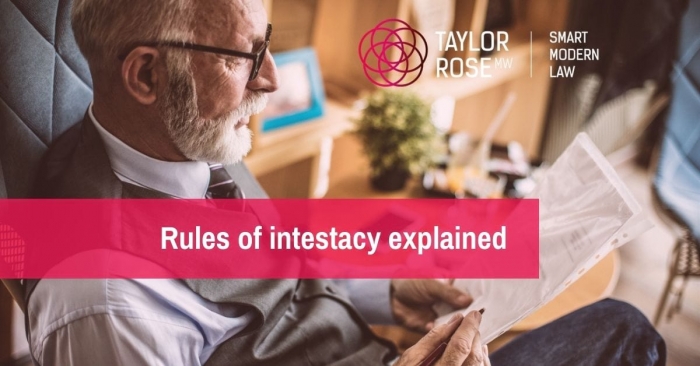Blogs
Do I need a Will? - Intestacy explained

ELLIE JAGGARD >
Solicitor
Mon 14 March 2022
In England and Wales, we have what is known as ‘testamentary freedom’ which in essence, allows us to choose who we intend for our assets and personal belongings to pass to on our death.
Although we do have this freedom, (subject to the Inheritance (Provision for Family and Dependants Act 1975), 31 million people in the UK have not exercised this right and as such have what is known as a ‘government made Will’, formerly known as the rules of Intestacy.
The rules of intestacy could mean that the person you wish to inherit your assets may not be who you intended. This could leave issues for your loved ones and make your estate susceptible to a claim from a disappointed beneficiary, especially if you live with your partner and you are not married or in a civil partnership.
The Rules of intestacy if you are married/in a civil partnership and do not have children:
In England and Wales, if you are married/ in a civil partnership without children and died intestate, everything you solely own will pass to your spouse/civil partner absolutely.
The Rules of intestacy if you are married/in a civil partnership and have children:
However, if you are married/in a civil partnership and you have children, the rules differ. Here the first £270,000 and all personal chattels will pass to your spouse/civil partner, the remaining estate will be split into two equal shares, one share to your spouse/civil partner and the remaining share will be split equally between your children. It must be noted that any joint assets would automatically pass to the surviving asset holder and would not be accounted for in the above calculation.
The Rules of intestacy if you are not married/in a civil partnership and have children:
If you have children and are not married, everything will pass to them equally. If any of your children were to have predeceased you, their share would pass equally between their children (grandchildren).
The Rules of intestacy if you are not married/in a civil partnership and do not have children:
If this is the case, then your assets will be split equally between your parents.
The Rules of intestacy if you are not married/in a civil partnership, do not have children or parents who are alive:
Who would inherit would depend on what relatives survive you.
If the above does not represent your intentions then it is advisable to exercise your testamentary freedom to deviate from the rules of intestacy.
Further to the above, it may be the case that you have put a Will in place but unknowing to you, it could have been revoked by marriage. Many people are unaware that if you marry without making the relevant provisions in your Will (known as an anticipation to marry clause), the said Will would be deemed as revoked upon marriage and as such your estate would be governed by the intestacy rules stated above.
![]() Ellie Jaggard is a solicitor who deals Wills, Probate and Lasting Power of Attorneys and can be contacted directly by email by clicking the 'contact us' should you require any further information. Please click here to read more about our Wills, Trusts and Probate services.
Ellie Jaggard is a solicitor who deals Wills, Probate and Lasting Power of Attorneys and can be contacted directly by email by clicking the 'contact us' should you require any further information. Please click here to read more about our Wills, Trusts and Probate services.





















